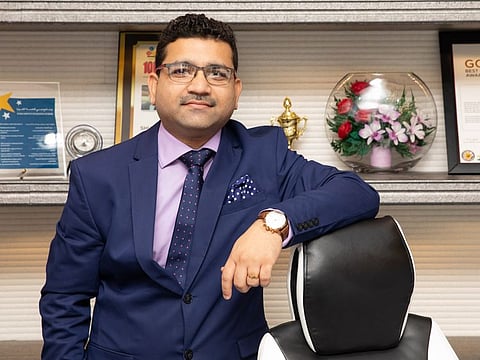UAE’s hospitality sector can expect a recovery from Q4
Local tourism will lead the way, says Danube Hospitality Solutions GM

Globally the hospitality sector faces a challenging situation due to the Covid-19 crisis that has resulted in reduced travel demand and booking cancellations. The situation in the UAE has been no different. However, with Dubai opening its door to tourists in July, the road to recovery will be faster compared to many other markets in the world.
Shubhojit Mahalanobis, General Manager, Danube Hospitality Solutions says the market saw a 52 per cent drop in occupancy levels in May, compared to the corresponding period last year. However, in July, the industry recorded an improvement in occupancy rates. “In spite of the current spike in cases, I believe that things will be better for the hospitality industry from Quarter 4,” he added.
Latest statistics from the Department of Culture and Tourism state that hotels in Abu Dhabi have been busier in July this year than they were at the same time last year. “There is also a surge in demand for luxury serviced apartments and holiday homes,” adds Shubhojit.
The government’s stringent safety measures, visionary leadership and innovative efforts implemented by the hospitality players have played a vital role in supporting businesses to recover. Here are some of the factors that have helped the hospitality sector to rebound.
Demand from residents
Shubhojit says that local tourism and domestic travel is expected to lead the UAE and broader GCC’s recovery from Covid-19. “Due to international travel restrictions post lockdown, many residents have been opting for mini getaways and staycations, preferring to stay in luxury serviced apartments and holiday home.”
“People want to go on a holiday, but safety has become the top priority. As a result, staycations are growing as residents will be seen traveling to locations closer to home. Seeing the rise in this trend, many establishments are now offering attractive packages and promotions to appeal to their visitors, which are a great re-entry strategy,” he explains. Shubhojit feels that with travel restrictions gradually easing up around the globe, the hospitality industry will experience a lot of pent-up demand for travel from both local and international travelers.
Return of international travellers
Dubai is a popular destination for business travellers and tourists. With the emirate now welcoming foreign tourists, the hospitality industry can now cater to both the commercial and leisure segments.
Shubhojit says, “The UAE is one of the first countries in the world to have opened doors to tourists, with all precautionary measures in place. We are expecting Dubai will see a faster recovery than other GCC markets. The UAE authorities have stipulated many rules and regulations to ensure the safety and security of tourists and residents. For example, all tourists entering the UAE need a negative Covid-19 PCR test,” he adds.
Moreover, the UAE air carriers have come up with innovative initiatives to create a positive impact and encourage international tourists to consider travelling again. For example, Emirates has announced a landmark programme to offer free global cover for Covid-19 health expenses and quarantine costs, says Shubhojit. “This gives travellers peace of mind. The global cover offered by Emirates will cover expenses up to 1.5 million Euros.”
There are several health and safety measures that the hospitality sector has to adhere to in order to run their operations and cater to their guests. Shubhojit believes a full recovery for the hospitality industry will not be without a fair share of challenges, but these initiatives will help put people at ease during such unprecedented times.
UAE is also a sought-after destination of hosting events. The country is all set to host 2020 Indian Premier League (IPL) tournament starting from September 19 with stringent safety protocols in place. Shubhojit says, “The Indian Premier League is a cricket extravaganza that generates a lot of revenue. From hosting the teams, media, sponsors and fans, the league generates F&B and events business for hotels as well.”
“As per rough estimates, IPL generates an estimated 25,000 room nights for hotels in India. And now, with the IPL being hosted in the UAE, this creates enormous revenue opportunity for the UAE with limited gating capacity. It also boosts confidence for local and international tourists to feel safe about visiting the country,” he says.
Investment advantage
Dubai Land Department has introduced Fractional Title Deed to boost small-scale investment in the hotel apartment segments that make it an exciting opportunity for small players to look at the hospitality sector for investment. Shubhojit says with Fractional Title Deed, an investor can buy up to half or a quarter of a hotel or serviced apartment.
“The concept is aimed at attracting investment into a hotel or serviced apartment projects in Dubai. It offers benefits like high rental return on investment, expected capital appreciation and carefree property management from the developer. I believe this will allow investors with smaller budgets to foray into the hospitality industry, which is a prime revenue driver in the region,” he says.
According to Shubhojit, “In such times, it is all about how soon one comes to terms with change, accepts it and adapts to it. UAE has demonstrated prowess in swiftly adapting to change and taking effective measures to contain the pandemic. It is one of the first countries in the world to have embraced the concept of the ‘new normal’. With markets opening up and the right minds guiding and overseeing the developments, the hospitality and travel and tourism industry is definitely on the right trajectory to make a rebound.”
- Advertiser's content
Sign up for the Daily Briefing
Get the latest news and updates straight to your inbox

